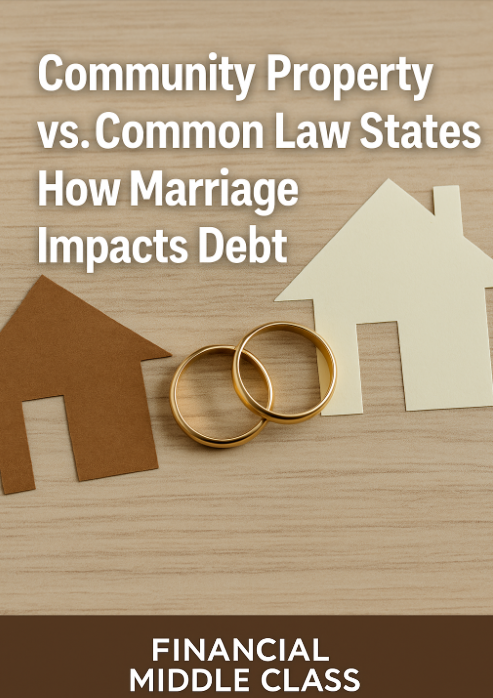When you say “I do,” you’re not just tying your lives together emotionally — you’re also tying your finances. The way your state defines marriage law can determine whether your spouse’s debt becomes yours, or whether you’re shielded from it.
This all comes down to two systems: community property and common law. Most people don’t know which system their state follows, but it can make a huge difference in how debt (and credit) plays out in your marriage.
What Is Community Property?
Community property is built on the idea that marriage is a partnership where everything — income, property, and yes, debt — is shared equally.
- Where it applies → Arizona, California, Idaho, Louisiana, Nevada, New Mexico, Texas, Washington, and Wisconsin. (Alaska has an optional version if both spouses agree.)
- What it means → Debts taken on by either spouse during the marriage are generally considered joint debts, even if only one spouse signed for them.
- Example → If your spouse takes out a $10,000 personal loan during the marriage in California, you may also be responsible for it — even if you didn’t know about it.
Pros of community property
- Encourages financial equality in marriage.
- Can make it easier to qualify for credit together.
Cons of community property
- One spouse’s reckless spending can drag the other down.
- Divorce or death can complicate who pays what.
What Is Common Law?
Common law states take a different approach. Instead of automatically sharing everything, they treat debts as belonging to the person who incurred them.
- Where it applies → The other 41 states follow common law.
- What it means → If your spouse racks up credit card debt in their own name, you’re usually not responsible unless you co-signed or are a joint account holder.
- Example → In Florida (a common law state), if your spouse opens a credit card and doesn’t pay, the creditor can’t come after you — unless your name is also on the account.
Pros of common law
- Offers financial protection if one spouse has bad money habits.
- Keeps liability more individualized.
Cons of common law
- One spouse may struggle to qualify for credit without the other’s income.
- Can create unequal financial responsibility in marriage.
Marriage, Debt, and Credit: Key Differences
| Feature |
Community Property States |
Common Law States |
| Debts during marriage |
Shared, even if only one spouse incurred |
Belong to the person who signed |
| Debts before marriage |
Usually separate, unless commingled |
Always separate |
| Divorce impact |
Debts split equally (or near equally) |
Debts follow the person who incurred them |
| Death of a spouse |
Surviving spouse may inherit responsibility |
Estate pays, surviving spouse usually not |
Why This Matters Right Now
- Planning a wedding? → Know how debt will affect your financial future.
- Living in a community property state? → Your spouse’s debt could already be your problem.
- Considering divorce? → Your state law may shape how debt is divided.
- Thinking about estate planning? → Community property rules can affect what creditors can claim after death.
Action Steps for Couples
- Find out your state’s law → Look up whether you live in a community property or common law state.
- Talk about debt openly → Transparency now saves fights later.
- Decide on joint vs. separate accounts → Tailor your banking and credit to your comfort with shared liability.
- Consider a prenup or postnup → Especially if one spouse has significant debt.
- Plan for the future → Estate planning helps manage how debts will be handled if one spouse passes away.
📌 Related Reads from Financial Middle Class:
Call to Action
Marriage isn’t just about love — it’s also about navigating shared or separate financial lives. Whether you live in a community property or common law state, understanding the rules now will help you avoid painful surprises later.

Pingback: Who Pays a Loved One’s Debt? Myths vs. Facts